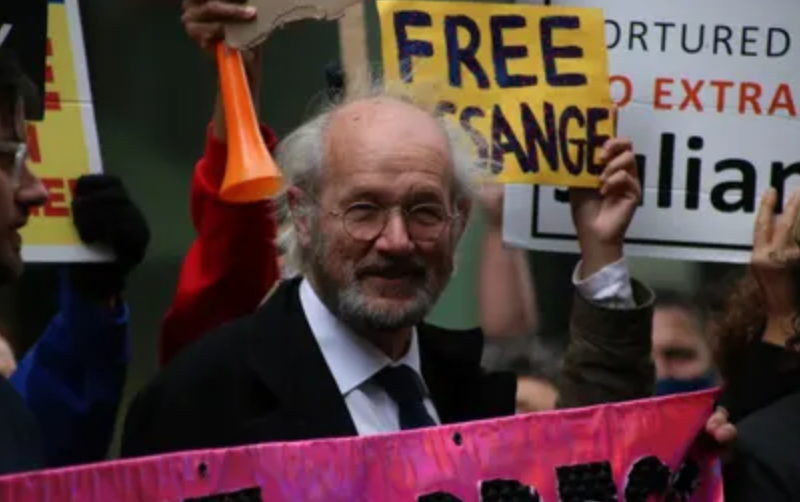Ben Lawrence’s documentary Ithaka assumes viewers have at least a passing knowledge of Julian Assange and what’s been done to him by the US and UK governments, though curious newcomers can learn the highlights, through news clips and interviews: Assange is tried under the US Espionage Act, ostensibly for publishing classified documents—which revealed US war crimes in Iraq and Afghanistan. That was back when Democrats were fine with Wikileaks, the organization Assange founded, because the war crimes were committed by the Bush Administration, when Democrats hated Bush. What really caused the US government to go after Assange was when he published the leaked emails of Hillary Clinton advisor John Podesta, which Democrats claimed tipped the election to Trump. Lest people forget—because Americans have very short political memories—it was the Trump Administration (or, the State Department within the Trump administration) which went ahead with the extradition request, and the espionage charges. The Obama Administration at least knew the consequences of charging a publisher of leaked documents.
Ithaka follows Assange’s wife Stella Assange (née Moris) but especially his father, John Shipton, as they each do what they can to raise awareness of Assange’s situation. Viewers also see some of their daily lives, which have been disrupted ever since Assange sought asylum in the Ecuadorian embassy in 2012 to avoid extradition to Sweden, where he probably would’ve then faced extradition to the United States. The movie doesn’t go into the nuts and bolts of the actual legal process, and at the time of filming, not many journalists—or people at all—were allowed either in Belmarsh Prison in the UK, nor into the courtroom, with Covid lockdown protocols providing a convenient excuse at the time, but also because that’s the way authorities want it: Assange isn’t allowed to give interviews, though at times in the movie we hear bits of conversation between he and Stella.
The film could’ve focused on Stella Assange—she has a full life taking care of their two children, helping with the legal battles, and being one of the main PR voices, but the choice to include more footage of John, Assange’s father is intentional. Early on, Stella compares John to Julian, saying that they’re a lot alike in temperament, intelligence, and humor, and—since film crews have no access to Assange—the best way to “see” Julian, to learn about him, is to observe his father.
John wasn’t involved or interested in politics until Julian started Wikileaks, and even then not until Julian’s persecution. But in the movie he’s sharp, knows all about the political forces at work in the UK, US, Europe and Australia. He and Julian’s brother, Gabriel Shipton, a filmmaker and one of the producers, attended the screening of Ithaka I attended, in Salem, Oregon, and John Shipton impressed everyone with his insights and analysis. As the movie shows, he was a building contractor before the family troubles. He shows how, if one is motivated enough, an understanding of world politics, and the ability to critique it, can be learned by anyone.
At the Q&A after the screening, John and Gabriel both stressed their surprising hope in the strength of the people to control their governments. They cite the recent movement by some “progressive” Representatives in the House calling for the Biden administration to drop all charges against Assange. This may feel like too little too late to some, but I understand the desire of Assange’s father to have hope. As the movie shows, the support coming from governments around the world, including the US, is bipartisan: Libertarians and leftists are aware what’s at stake.
The most moving words John spoke at the Q&A were describing how the First Amendment, which says, in part: “Congress shall make no law respecting an establishment of religion, or prohibiting the free exercise thereof; or abridging the freedom of speech, or of the press....” is the inspiration for other governments and human rights activists. If Assange is extradited, he’ll inevitably be convicted of espionage in the US, for the publishing of leaked documents demonstrating US war crimes in Iraq and Afghanistan—a conviction which has never happened before and which would make any journalist or news organization who uses leaked documents open to the same persecution. Which is why the five big news organizations who used the Wikileaks documents have now, finally, come around to defending Assange. Unfortunately, US propaganda is so strong that Democrats and other centrists now openly favor censoring news that doesn’t come from government-approved sources, so as to avoid “misinformation.”
Ithaka is screening for one-night events at independent cinemas, though it was officially released in the US in November 2022. John and Gabriel are touring with the movie in the US, and Stella at some showings in Europe. The Q&A was worth staying for, as was seeing the movie in a full theater: at times, based on the mostly mainstream media blackout about Assange, one can feel a little isolated, thinking that no one cares. Being in a room full of like-minded people was a hopeful experience. The highlight of the night was when the movie showed an excerpt from Biden’s acceptance speech, where he praises, with a straight face, the value and importance of “truth.” A woman in back yelled out, “You sit on a throne of lies!” And everyone laughed and clapped.

